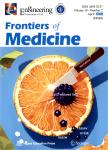Protein phosphatase magnesium-dependent 1δ is a novel tumor marker and target in hepatocellular carcinoma
Protein phosphatase magnesium-dependent 1δ is a novel tumor marker and target in hepatocellular carcinoma作者机构:Department of Oncology Nanjing First Hospital Nanjing Medical University Nanjing 210006 China Department of General Surgery Nanjing First Hospital Nanjing Medical University Nanjing 210006 China Department of Pathology Nanjing First Hospital Nanjing Medical University Nanjing 210006 China Department of General Surgery Nantong Tumor Hospital Nantong 226361 China Department of Pathology Nantong Tumor Hospital Nantong 226361 China Department of Surgery Faculty of Medicine The University of Hong Kong Hong Kong China
出 版 物:《Frontiers of Medicine》 (医学前沿(英文版))
年 卷 期:2016年第10卷第1期
页 面:52-60页
核心收录:
学科分类:071011[理学-生物物理学] 0710[理学-生物学] 071010[理学-生物化学与分子生物学] 081704[工学-应用化学] 07[理学] 08[工学] 0817[工学-化学工程与技术]
基 金:This study was supported by grants from the National Natural Science Foundation of China (Nos. 81000880 and 81370057 to Zhi Xu) the Key Project supported by Medical Science and Technology Development Foundation Nanjing Department of Health (JQX12007 to Zhi Xu) the clinical special project for Natural Science Foundation of Jiangsu Province (BL2012016 to Jinfei Chen) and the Nanjing 12th Five-Year Key Scientific Project of Medicine to Jinfei Chen
主 题:PPM1D hepatocellular carcinoma prognosis target therapy
摘 要:Hepatocellular carcinoma (HCC) is a lethal liver malignancy worldwide. In this study, we reported that protein phosphatase magnesium-dependent 16 (PPM1D) was highly expressed in the majority of HCC cases (approximately 59%) and significantly associated with high serum a-fetoprotein (AFP) level (P = 0.044). Kaplan- Meier and Cox regression data indicated that PPM1D overexpression was an independent predictor of HCC- specific overall survival (HR, 2.799; 95% CI, 1.346-5.818, P = 0.006). Overexpressing PPM1D promoted cell viability and invasion, whereas RNA interference-mediated knockdown of PPM1D inhibited proliferation, invasion, and migration of cultured HCC cells. In addition, PPM1D suppression by small interfering RNA decreased the tumorigenicity of HCC cells in vivo. Overall, results suggest that PPM1D is a potential prognostic marker and therapeutic target for HCC.



